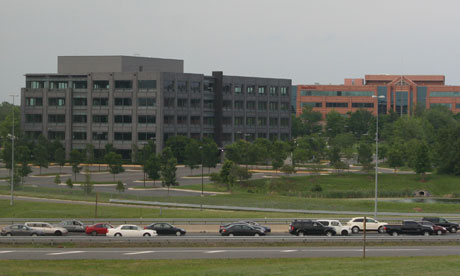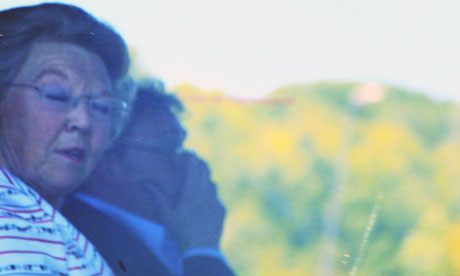It's all change
at Bilderberg this year, with a new chairman, new media and
Occupy Bilderberg knocking at the gates.
Everything's
set. The hotel is being primped and hoovered, the security is arriving,
the press is nowhere to be seen, and I just had a really boring crab
salad. It's shaping up to be a vintage
Bilderberg.
We
were lunching in the Palm Court restaurant of the Westfields Marriott
hotel, in Chantilly, Virginia. A few days from now, this hotel will be
dripping with billionaires and bankers, industry CEOs and finance
ministers, here for the annual Bilderberg summit. "The leaders of the
world are coming to our hotel", beams one member of staff. "Are you here
for the brunch?"
We are. Most of the other guests have left by
now. The hotel is edging towards lockdown. All that's left is a team of
nervy conference organizer who start filming us with their iPhones,
several dozen security operatives, me, my wife and a really rather
boring 'spook', brunching on an adjacent table.
He droned on for
the full length of a crab salad about his "internal and external
drivers", about how "I got a panel of three-star admirals together" to
secure a "$30m contract" and how "CACI excels in capture management".
He
talked fondly of CACI International Inc (a giant defense contractor),
although more recently he's had "a nice success rate with Booz Allen"
(another giant defense contractor). His world was the deathly dull blur
between the federal government and private defense corporations. The
grim feeding trough of "systems solutions", "security logistics" and
"mission assurance". My crab ended just as he was declaring, wisely:
"When you leave the navy and you go to a contractor, you say: what's my
mission?"
His mission for the next week or so is to keep the queen
of the Netherlands, the chairman of Barclays, and the chairman,
vice-chairman and CEO of Shell Oil safe and sound for a three-day
conference. The hotel is encircled by the offices of the world's largest
arms' manufacturers, 15 minutes up the road from the headquarters of
the CIA. I suspect they'll be OK.
 Welcome to Chantilly: a little bit of paradise on earth. Photograph: Charlie Skelton for the Guardian
Welcome to Chantilly: a little bit of paradise on earth. Photograph: Charlie Skelton for the Guardian
The Bilderberg conference was last here in Chantilly, at the exact
same godforsaken spot, back in 2008 – which, like 2012, was a US
election year, and the moment the current economic woes really started
hitting the fan. You might remember, it was the year when then-senators
Barack Obama and Hillary Clinton paid a flying visit to Bilderberg (aka
'an event in northern Virginia'), after shaking off the press pack
during the Democratic presidential campaign. AP had the story:
"Reporters
travelling with Obama sensed something might be happening between the
pair might when they arrived at Dulles International Airport after an
event in northern Virginia and Obama was not aboard the airplane."
You can watch the
hilarious footage
of Robert Gibbs, Obama's press secretary, trying (and failing) to
placate a furious press corp, who found themselves tricked aboard a
flight to Chicago. "Others had a desire to meet with him in a private
way," he explains. This is an extraordinary admission from Gibbs –
"others" clicked their fingers, and Obama came running, with Hillary in
tow.
Bill Clinton was introduced to the political big league at
Bilderberg 1991. The man who introduced him was Vernon Jordan, a lawyer,
civil rights activist and currently board member of Lazard investment
bank. Speaking last year about the occasion, Jackson recalls:
"In
1991, I took Bill Clinton to the Bilderberg meetings in Baden Baden,
Germany. Bilderberg meetings have been going on since 1954, sort of the
North-American / European Alliance."
Later, after Clinton won the election:
"The
steering committee of Bilderberg came to Washington in January, and I
called the president up and I said 'Mr President, they're here' – and he
came to the Four Seasons hotel, and the Europeans felt like they owned
him because they met him when he was totally unknown."
That's
interesting: a meeting of the Bilderberg steering committee at the Four
Seasons in Washington? In January? But according to Bilderberg's
official website, "Bilderberg's only activity is its annual conference".
As for this year's election, rumours are already circulating about Bilderberg and presidential running mates, sparked off by a
Washington Post report back in April on the matter of Republican senator Marco Rubio's speech at the Summit of the Americas:
"[John] Edwards gave a speech in June 2004 at the Bilderberg conference
that was widely credited as one reason John Kerry chose him."
Aside
from the US presidency, the big debate of Bilderberg 2012 is likely to
be: what in Hades do we do about Greece? The Eurozone is Bilderberg's
biggest project, but it's been looking distinctly shaky of late. What's
to be done? You can feel the unwillingness of Bilderberg to countenance a
'Grexit' in the stern words of Bilderberg spokesperson, the UK member
of parliament for Rushcliffe, Kenneth Clarke. To leave the Euro, says
Clarke, would be "disastrous" for the Greeks. "If they get a hopeless
lot of rather cranky extremists elected at the next election then they
will default on their debt." Clarke took the time to brand eurosceptic
British MPs "right-wing nationalists", and euroscepticism itself
"irresponsible".
Clarke's most telling remark is that: "It's going to take a crisis, an absolute crisis, to make Europe's leaders act."
This week's Economist magazine agrees: "For the past six decades, steps forward to greater European union have taken place at moments of incipient crisis."
"A
consensus is slowly emerging that, whether a Greek exit is to be
averted or weathered, there will have to be a greater level of
integration in the euro zone, with tighter constraints on the freedom of
national governments."
This message, that out of the
struggle will come a new strength, seems to be the Bilderbergian line.
For example, EU Commissioner Joaquin Almunia (
whom we spotted at Bilderberg 2010)
says we need now to "reinforce the European Parliament's role" which
"will also strengthen the role of the [EU] Commission". So his solution
to the crisis: "I need a bigger office."
The Economist says that
if the "elite venture" of Europe is to survive and thrive, "Europe's
elites" have got their work cut out. It ventures to give the elites some
"unashamedly technocratic" advice on how to forge their closer union,
but it needn't worry, the technocrats of Bilderberg seems to have the
matter in hand. Mario Monti (unelected Italian PM, Bilderberg steering
committee) said this week: "Europe can have euro bonds soon."
But
we're not in Europe now, we're in Chantilly, and the CIA is just up the
road from the conference venue, so protestors had better stay on their
best behaviour. And we're expecting plenty of them – gathering under the
activist umbrella:
"Occupy Bilderberg"
What a difference a year makes. Occupy Bilderberg? I love it. The
Occupy movement
seems finally to have realised that the problem isn't the 1%, it's the
0.001%. It's the guys and gals and whatever David Rockefeller is who are
meeting in Chantilly, Virginia, at the end of the week. Many hundreds
of protestors have pledged to show up. And who knows, they may just
manage to drag the mainstream news media with them.
Historically,
one of the biggest problems people have had with Occupy is that its aims
and demands have been a little, shall we say, "diffuse". Not the case
with Occupy Bilderberg. That's the nail getting hit squarely on the
head. Occupy Bilderberg is keyhole activism. Picking the exact right
spot and sticking the scissors in.
"We refuse to pay for the
banks' crisis" was the cry from OccupyLSX back in the autumn. They
demanded an end to "our democracy representing corporations instead of
the people." What Bilderberg represents is the fact that our democracy
IS our corporations. And politics is just the wake behind a shark fin.
Time to go fishing.





